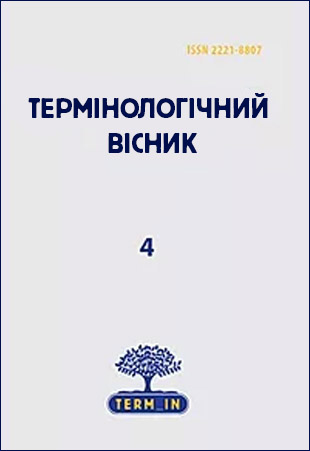Socio-Political Vocabulary in Modern Media Language

Founders
National Academy of Sciences of Ukraine,
Institute of Ukrainian Language of NAS
Publisher
Institute of the Ukrainian Language of National Academy of Sciences of Ukraine
Scientific journal Ukrainian Language is registered by the Ministry of Justice of Ukraine as print media (Certificate: Series КВ № 12180 – 1064 ПР of January 12, 2007).
Included in the list of printed scientific specialized editions of Ukraine (Order of MES of Ukraine no528 from 12.05.2015)
Back side of the journal
Nina Yatsenko
Information about the author: PhD Philology, Senior Researcher of Grammar and Scientific Terminology Department, Ukrainian Language Institute, National Academy of Sciences of Ukraine (Kyiv, Ukraine)
e-mail: n.yats@ukr.net
Title: Socio-Political Vocabulary in Modern Media Language
Rubric: Functional and Cognitive Terminology
Abstract: Socio-political updated vocabulary, some word creative means, lexical- semantic processes in media language of the early 20th cent. are considered in the article. This group is the most numerous as a result of a sharp increase in public attention to the phenomena of nation-building and economic reform. Words by their origin functioning activity, semantic content, specific lexicographical presentation are dissimilar. One important source of lexical enrichment is derivation. The essential feature of the discovery of new nominations are widely used as generators of bases of lexical items which most attention is focused society, the so-called keyword of our days (екс-, нео-, пост-, євро– etc.). Quite productive in the test period was a way of creating new words by the initialism (literal and less phonemic) abbreviations as language reaction to changes in policy and economic and political structure of the country, as well as the expansion of its international relations (for example: ОБСЄ). According to the examples a lot of words get into media language with new meanings because of metaphor and metonymy. Borrowings are traditionally one of the most important source of enrichment in the media language. Nowadays the language of modern journalism operates a significant number of English social and political, social and economic vocabulary and terminology. Anglicism and Americanism tends to reflect primarily Europeanisation and internationalization, which are greatly stimulated by direct and indirect contacts with foreign countries.
Borrowings in the language of contemporary media reflect the phonetic-and- spelling, graphic and orthographic lack of stability, functioning often two or more versions that require their normalization. So fundamental changes in social and economic life found their reflection in real denotative-connotative reorientation of substantial part of lexical nomination in the modern media, as well as Ukrainian common practice. Today is a great group of words and terms, that was previously used sporadically for naming both foreign and imperial Russia realities and concepts, and is actively revived and function as nominative units now. Language practice of media has more and more examples of mainstreaming in the field of wide usage of certain linguistic units. On the way to the codification of these units there is a significant time factor that has to check each one on its importance in modern language space. P. Y. Hrytsenko said: “The process of Ukrainianization is unavoidable. It already is. Formation of multilingual generation starts. What will be in this language foundation whether English and French, and Russian later – time shows”.
Keywords: social-and-political vocabulary, new borrowing, updated vocabulary, metaphor, metonymy, abbreviation.
References:
- Busel, V.T. (Ed.). Velykyi tlumachnyi slovnyk suchasnoi ukrainskoi movy (2004): Irpin: VTF “Perun” (in Ukr.).
- Horodenska,K.H. (2009). Novi zapozychennia i novotvory na tli fonetychnoi ta slovotvirnoi pidsystem ukrainskoi literaturnoi movy. Ukrainska terminolohiia i suchasnist. (Vol. VIII). Kyiv: KNEU (in Ukr.).
- Iermolenko, S.Ya. (2001). Suchasni problemy doslidzhennia literaturnoi movy. Aktualni problemy ukrainskoi linhvistyky: teoriia i praktyka. (Vyp. IV, 3–12). Kyiv (in Ukr.).
- Klymenko,N.F., Karpilovska,Ye.A., Kysliuk, L.P. (2008). Dynamichni protsesy v suchasnomu ukrainskomu leksykoni. Kyiv: Vyd. dim Dmytra Buraho (in Ukr.).
- Nimchuk,V.V. (2002). Problemy ukrainskoho pravopysu XX – pochatku XXI st. Kamianets-Podilskyi : Kamianets-Podilskyi derzh. ped.un-t (in Ukr.).
- Slovnyk ukrainskoi movy (2012). Ker. V.V.Nimchuk ta in.; vidp. red. V.V.Zhaivoronok. Kyiv: “Prosvita” (in Ukr.).
- Styshov,O.A. (2003). Ukrainska leksyka kintsia XX stolittia (na materiali movy zasobiv masovoi informatsii). Kyiv (in Ukr.).
- Taranenko,O.O. Metonimiia. In Ukrainska mova: Entsyklopediia. (2004). (pp.339–342). Kyiv: Vyd-vo “Ukr. entsykl.” im. M. P. Bazhana (in Ukr.).
- Taranenko,O.O. (2015). Aktualizovani modeli v systemi slovotvorennia suchasnoi ukrainskoi movy (kinets XX XXI st.) : [monohrafiia]. Kyiv: Vyd. dim Dmytra Buraho (in Ukr.).
- Turovska,L.V., Vasylkova,L.M. (2008). Novi slova ta znachennia. Slovnyk. Kyiv: Dovira. (in Ukr.).
Legends:
D.t. – hazeta “Dzerkalo tyzhnia”
UM – hazeta “Ukraina moloda”
HPU – hazeta “Po-ukrainsky”


